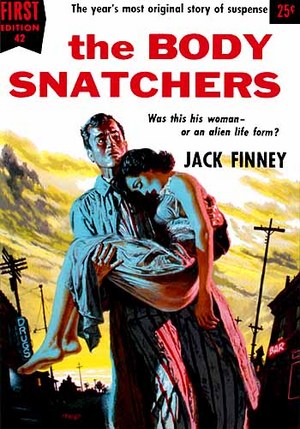Attack of the Capitalist Realist Straw Women
Thu. March 9, 2006Categories: Abstract Dynamics
 |  |
‘Every day seems like a natural fact/ but what we think/ changes how we act…’ – Gang of 4, ‘Why Theory?’
‘Neoliberalism … has pervasive effects on ways of thought to the point where it has become incorporated into the common-sense way many of us interpret, live in, and understand the world.’ – David Harvey, A Brief History of Neoliberalism
Last Friday, as a long, bitter and ultimately successful battle to wrest control of the union branch from managerialists was nearing its end, I was around the college to sound out staff views. I asked a couple of members of staff what they thought of the union, and suddenly found myself in a situation akin to that moment in a Horror or Science Fiction film when the protagonist discovers that the ‘people’ he is talking to are Not Like Us.
I had naively expected that more or less all lecturers would support the union in its struggles against the continuing implementation of the government’s authoritarian-bureaucratic ‘compliance’ agenda and the spread of neo-liberal ‘reforms’, if not out of principle then for reasons of personal expediency. But I found myself talking to (pod) people from my worst imaginings. Neo-liberal Stepford Wives. The effect was heightened by sleep deprivation and adrenal depletion: everything felt edgy but at the same time distant, disconnected, as if shot through a fish-eye lens. Words came at me very quickly, while my responses were desperately slow, in part because I was scarcely able to credit what was I was hearing.
Here were people who really, genuinely seemed to fully believe that ‘it isn’t for the union to criticise management. Management are there to manage. That is why there are managers and workers.’ (Interesting how, as Harvey suggests in his book on neoliberalism, the neoliberal ethic of ‘freedom’ is so often accompanied by an utterly credulous faith in authority.) The union shouldn’t raise the issue of the principal’s salary because ‘he is on a different contract to us. The market rewards different skills differently.’ Click, whirr. The union shouldn’t complain about increasingly invasive appraisal systems because vacant Stepford blink ‘that’s the real world, and we can’t change that here.’ ‘Where my husband works’ (uh-oh) mirthless Nanette Newman smile ‘all staff are appraised and if they fall into the bottom 20%, they will be sacked.’
Was this some kind of loathsome awake dream, in which Capitalist Realist Straw Women from my unconscious had assumed a corporeal form?
At this point, a member of middle management barreled into view, as rotundly pleased-as-punch with himself as a minor character from Dickens. ‘Yes,’ he boomed, (sounding for all the world like one of those puffed-up local dignitaries forever telling young Pip that he ‘should be grateful to them what ‘ave brought ‘im up by ‘and’), ‘You should count yourself lucky that you’ve got this management! I think we should bring in performance-related-pay. If a student leaves your course, you should lose money from your wages, instantly!’
What was interesting, theoretically-speaking, about what all three of them had to say was its complete lack of any ethical or even economic argument for the rapacious state of affairs they were cheerfully advocating. At most there was an implication that neo-liberalization would lead to greater efficiency. But the main appeal of their arguments was not to ‘improvement’ of any kind, but to ‘reality’.
An ideological position can never be really successful until it is naturalized, and it cannot be naturalized while it is still thought of as a value rather than a fact. In the case of the lecturers I was talking to, it seems that Capitalist Realism has been so successful in installing Business Ontology that there is no longer any question of evaluating it at all. Business assumptions are now transcendental presuppositions, defining the horizons of the thinkable. It is simply obvious that everything in society, including education, should be run as a business. It is simply obvious that no other criteria can come into play. Hence the reason that my flailing attempts to raise issues of ‘justice’ were not so much rebuffed as greeted with blank incomprehension.
But it is not only that Business Ontology cannot be evaluated within the framework of Capitalist Realism. Evaluation of any kind is foreclosed by Capitalist Realism, which is all ‘is’ and no ‘ought’. Insofar as there is an ‘ought’, it is subordinated to the Capitalist Reality principle: we must fall in line with what must be the case. The ‘must’ of ethical duty is quickly elided with the ‘must’ of causal necessity. There is a kind of reversal of Kant, the slogan now not Kant’s ‘you can, because you must’ but Capitalist Realism’s ‘you must, because there is no alternative’. This accounted for the lecturers’ otherwise baffling obsesssion with ‘research’ (i.e. the union shouldn’t complain about management wages until it had ‘researched the contracts’, as if establishing the legal status of such contracts would somehow settle the question of their fairness.) We must diligently consign ourselves to ‘research’ because the nature of reality has already been decided, by an Other, and all we can do is find out about it. (Harvey again: ‘In so far as neoliberalism “values market exchange ‘as an ethic in itself, capable of acting as a guide to all human action, and substituting for all previously held ethical beliefs”, it emphasizes the significance of contractual relations in the marketplace.’ Note that I think we need to put ‘market exchange’ in inverted commas here; markets in Really Exisiting Capitalism are an ideological construct rather than an actuality.)
A number of hyperstitional questions remain, however. If we in education are not ‘in the Real World’, and the Real World is characterized as a place of relentless Hobbesian struggle, exactly why should we accept the incursion into our alleged idyll of the Business serpent? Since it has been possible to sustain our Unreal World, thus far, why should we not fight to preserve this unreality?
But all this talk of the Reality of business needs to be taken with more than a pinch of salt. I mean, it’s not as if dealing with teenagers every day is living out some escapist fantasy while performing PowerPoint presentations to irritable CEOs and spooling out vacuous semiotic pollution puts you in unshielded contact with the seething burn-core of the cosmos.
Anyone doubting this need only watch The Apprentice, which should be compulsory viewing for all Marxists. The programme serves the indispensable function of massively desublimating and demystifying Business, amply demonstrating that the supposed ‘Reality’ of Business is inseparable from the most facile fantasy structures. Pathetic self-delusion, baboonery dressed up in Harvard Biz School lingo, massive ego over-investment in projects so abjectly inane that they are not even pointless: suddenly it all becomes clear why Capitalism is so mired in banality and incompetence.
[…] https://k-punk.org/attack-of-the-capitalist-realist-straw-women/ […]